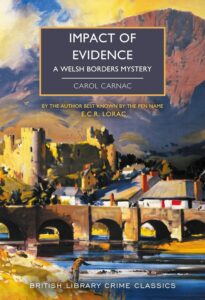
Impact of Evidence
by E.C.R. Lorac, Carol Carnac
Genres: Crime, MysteryPages: 221
Series: British Library Crime Classics
Rating:

Synopsis:Near St Brynneys in the Welsh border country, isolated by heavy snow and flooding from the thaw, a calamity has occurred. Old Dr Robinson, a known 'menace o the roads', has met his end in a collision with a jeep at a hazardous junction. But when police arrive at the scene, a burning question hints at something murkier than mere accident: why was there a second body - a man not recognised any locals - in the back of Robinson's car?
As the local inspectors dive into the muddy waters of this strange crime, Chief Inspector Julian Rivers and Inspector Lancing are summoned from Scotland Yard to the windswept wilds, where danger and deceit lie in wait.
Puzzling and atmospheric, this exceedingly rare mystery from one of the masters of crime fiction's Golden Age returns to print for the first time since its publication in 1954.
It’s always exciting when the British Library Crime Classics series bring out another of E.C.R. Lorac’s books, especially the rare and out of print ones. I’m slightly less fond of Lorac’s work under the Carol Carnac pseudonym, perhaps because I’m not as fond of the detective — though Lorac’s McDonald doesn’t show us a lot of his personal life, he does show a constant decency and patience, and that impression has been cumulative through the books in which he’s featured. Lancing and Rivers don’t really compare (and don’t really stand out to me, either, though nor did McDonald at first).
In any case, Impact of Evidence is the latest, a book which is out of print and almost unattainable until now. The setup is intriguing: details are drawn from Lorac’s own experience of Lunesdale, but transplanted to the Welsh borders, and she depicts farm life with her usual care for what’s needed and how those communities worked. As usual, she’s idealised the working farmer a little here, with her usual “salt of the earth” rock-solid decent characters — but having read more of her work, one’s always aware of the tension there, and when those people might do wrong.
I admit I was onto what happened fairly early on just because of certain details that were drawn to the reader’s attention multiple times, but it was still interesting to see how it worked out, and how some things were subverted (like the Derings matter-of-fact behaviour about the accusations of them).
Rating: 3/5

Leave a Reply